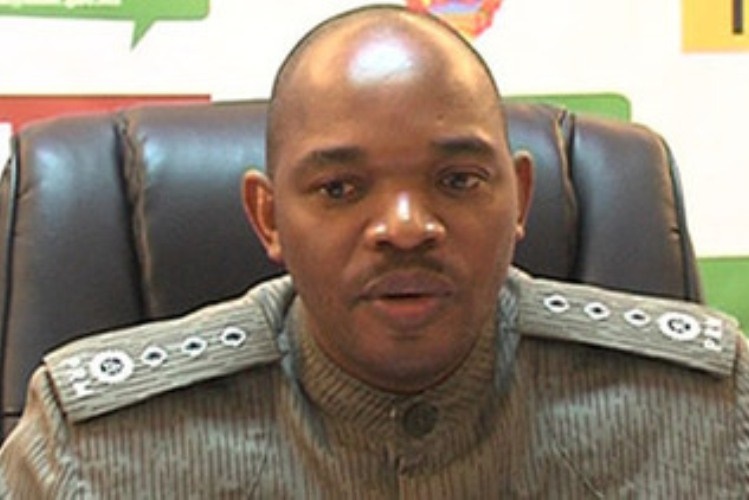Mozambique: Three sentenced to 30 years for kidnapping ; one still at large after jailbreak
Mozambique police still refuse to confirm identity of Moamba bodies

File photo / Inácio Dina
The general command of the Mozambican police on Tuesday insisted it does not know the identity of the two bodies exhumed from a shallow grave in Moamba district, about 70 kilometres northwest of Maputo, on Friday – even though they were positively identified by relatives.
There is no serious doubt that the bodies belong to Jose Coutinho and Alfredo Muchanga, two convicted prisoners, who were seized from police custody in central Maputo on 24 April.
At the time it was thought that fellow criminals had rescued them from the police – but the grim discovery in Moamba shows that, far from being released, they were taken to be executed and hence silenced.
They were seized in Maputo at around midday on 24 April. Moamba residents told the independent television station STV that they had heard gunshots at around 15.00 that afternoon. Thus it seems that the two men were driven immediately to their deaths.
No serious attempt was made to hide the bodies. They were dumped in a shallow grave and Moamba residents exhumed them last Friday. STV showed a photograph of Coutinho to one of those who dug up the bodies and he confirmed that Coutinho was indeed one of the men in the grave.
At the morgue in Maputo Central Hospital relatives identified both Coutinho and Muchanga. Yet despite this evidence, the spokesperson for the police General Command, Inacio Dina, speaking at a Tuesday press briefing, claimed that the police still do not know the identity of the bodies.
Dina said the police are waiting for a forensic report which should identify the bodies and indicate the cause of death. “The identification of a body by the police depends on the examination by forensic doctors”, he said. “A report is produced which contains the identity of the individuals and the probable cause of death. This is the report the police are waiting for”.
Journalists pointed out that the forensic report is already in the hands of the Attorney-General’s Office. So how is it that the police do not have a copy? Dina was unable to answer such questions.
Waiting for the report “does not mean that the police are not doing anything”, Dina claimed – though he was quite unable to explain what the police were doing, or shed any light on how two dangerous criminals were snatched from police custody in broad daylight in the heart of the capital.
That somebody in the police command cooperated with the gang who seized Coutinho and Muchanga seems indisputable. In violation of the normal rules of police procedure, the two men were taken from their cells to be interrogated in a police station about their alleged attempts to sabotage prison security. The correct procedure, however, would have been for the Criminal Investigation Police (PIC) to interrogate the men in their cells, not drive them across the city.
The gang obviously knew the route followed by the police van carrying the prisoners, and four hooded men were able to ambush it, shoot out the tyres, and seize Coutinho and Muchanga. The two policemen in the vehicle made no attempt to defend the prisoners, but fled.
Coutinho was suspected of involvement in the murder last year of senior Maputo prosecutor Marcelino Vilanculos, who was gunned down outside his home in Matola city on 11 April 2016. Vilanculos was handling a number of high profile, sensitive cases, including the wave of kidnappings of business people of Asian origin.
Another suspect in this case, Abdul Tembe, who allegedly drove the car used by the death squad, escaped from the Maputo top security prison under mysterious circumstances last October. Tembe’s escape led to the arrests of the director of the prison, Castigo Machaieie, and eight other prison staff.
The lawyers for a third suspect, Edith d’Compta da Camara Cylindo, submitted a writ of habeas corpus earlier this year – but, according to a report in Wednesday’s issue of the Maputo daily “Noticias”, the Supreme Court turned the request down.
The Vilanculos murder seems deeply entwined with the spate of kidnappings of business people that hit Mozambican cities as from 2011. The Attorney-General’s Office (PGR) has accused the fugitive Momad Assife Abdul Satar (“Nini”), one of the men convicted of the murder of top investigative journalist Carlos Cardoso in 2000, of “forming a criminal organization with the purpose of kidnapping citizens, and later demand large sums of ransom money”.
The PGR argues that Satar formed “a criminal alliance” with Coutinho and Cylindo which ran the kidnapping ring.













Leave a Reply
Be the First to Comment!
You must be logged in to post a comment.
You must be logged in to post a comment.